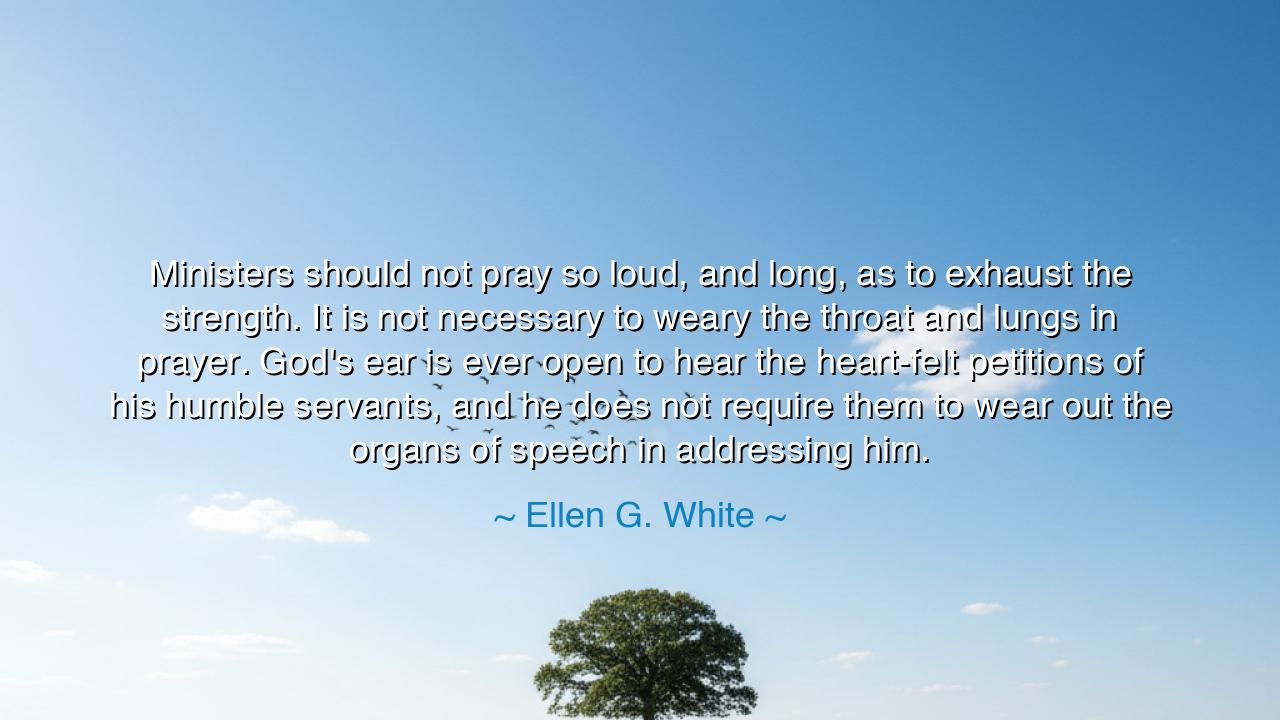
Ministers should not pray so loud, and long, as to exhaust the
Ministers should not pray so loud, and long, as to exhaust the strength. It is not necessary to weary the throat and lungs in prayer. God's ear is ever open to hear the heart-felt petitions of his humble servants, and he does not require them to wear out the organs of speech in addressing him.






The words of Ellen G. White fall with the clarity of a sacred bell: “Ministers should not pray so loud, and long, as to exhaust the strength. It is not necessary to weary the throat and lungs in prayer. God’s ear is ever open to hear the heart-felt petitions of his humble servants, and he does not require them to wear out the organs of speech in addressing him.” Here lies a timeless reminder: that true prayer does not depend on volume, length, or outward display, but on the sincerity of the heart.
White, a visionary of the 19th century and a guiding voice of the Seventh-day Adventist movement, lived in a time when public devotion was often judged by outward zeal—by fiery tones, long hours of speech, and visible displays of piety. Yet she pierced through the illusion, teaching that the strength of prayer lies not in exhausting the body but in lifting the soul. A whisper of genuine faith rises higher than the longest cry of vanity, for the Almighty listens not to the lungs but to the heart.
This wisdom echoes the teaching of Christ himself, who warned against “vain repetitions” and prayers made for show. He pointed to the publican who prayed simply, “God be merciful to me a sinner,” and declared that such a humble plea was worth more than the long, elaborate prayer of the Pharisee. Ellen White’s counsel is the same: the divine ear bends to heart-felt petitions, not to the straining of voices or the weariness of speech.
History itself gives us mirrors of this truth. Hannah, the mother of Samuel, prayed silently in the temple, moving her lips but making no sound. Though others thought her drunk, God saw the depth of her longing and answered her prayer. Her quiet petition shaped the destiny of Israel more than the loudest chants of priests. And in her story we see White’s teaching embodied: that it is the heart’s cry, not the throat’s labor, that moves the heavens.
The deeper meaning of White’s words lies in the recognition that outward forms can become empty if they exhaust the body while neglecting the soul. The strength given to us is not meant to be wasted in noise, but consecrated to true communion. Prayer is not performance; it is relationship. When we mistake one for the other, we weary ourselves and forget the simplicity of speaking to a God who already knows, already loves, already listens.
The lesson for us is profound: do not measure your devotion by the length of your prayer or the volume of your voice. Instead, measure it by its truth. A prayer that springs from humility, gratitude, or repentance is greater than a thousand words uttered without the fire of the heart. Let your prayer be like a pure stream, clear and steady, rather than a storm that exhausts and passes quickly.
Practical action lies within reach. Begin by making your prayers simple and sincere. When you feel tempted to stretch words into performance, pause and return to the essence of your need. Pray not to impress others, but to commune with God. Conserve your strength for the work of love and service, and let your prayers be fuel, not burden. Even a sigh of faith, uttered in silence, is more powerful than the loudest sermon without spirit.
So let Ellen White’s words stand as a lamp to future generations: that God’s ear is always open to his children, and he requires no wearying display. The voice may grow faint, but the heart may speak forever. And in that heart, when it prays with humility and truth, lies a strength greater than noise and longer than speech—a strength that touches eternity.






AAdministratorAdministrator
Welcome, honored guests. Please leave a comment, we will respond soon